
Plato Baptized
Towards the Interpretation of Spenser's Mimetic Fictions
Seiten
1988
University of Toronto Press (Verlag)
978-1-4426-1484-0 (ISBN)
University of Toronto Press (Verlag)
978-1-4426-1484-0 (ISBN)
- Lieferbar (Termin unbekannt)
- Versandkostenfrei
- Auch auf Rechnung
- Artikel merken
Bieman argues that from experiences of personal knowing the writer, his fictive protagonists, the reader and the interpreter participate in the production of further experiences throughout which other meanings may, evanescently, be glimpsed.
Plato Baptized places a variety of Spenser’s texts in the history of speaking, writing, reading, and interpreting which stretches from Plato’s mentors, Pythagoras and Socrates, to the present. Expansive and formidable in its complexity of argument, yet constantly lucid, the book presents its own perceptive readings of Spenser and his literary forebears as instances of ‘participatory mimesis' – a process Elizabeth Bieman identifies as central in the tradition of biblicized Platonism and Neoplatonism which informed Spenser’s habits of thinking.
The first five chapters offer a diachronic thread through the maze of ancient texts, philosophical and biblical, which Spenser assimilated synchronically, and from which he drew the paradigms of image and language that represented for older readers evidences of his Christian humanist ‘faith.’ The later chapters explore Spenser’s ever-equivocal metaphoric language, through fictions that represent all levels of the human souk, cross-connecting and unifying the world of intertextualized living.
The book’s thread offers occasional egress from maze and void. Tracing the evidences of questioning and doubt now fully familiar, along with those of faith, Bieman shows skepticism and affirmation ceding place to each other continually, unsettlingly, creatively, throughout tradition. The elements that academic analysis and skeptical questioning put asunder come together in the rhythmic process of questioning, aporia, and the occasional flash of understanding that the Elizabethan theologian knew as metaphoric baptism. The process, for Spenser, ends neither in despair nor complacency; in the canon, indeed, it does not end.
Bieman argues that from experiences of personal knowing – which the mimetic languages of ancient philosophy, and biblical and Renaissance story cannot fully capture, but to, and through, which they torturously lead – the writer, his fictive protagonists, the reader and the interpreter participate in the production of further experiences throughout which other meanings may, evanescently, be glimpsed.
Plato Baptized places a variety of Spenser’s texts in the history of speaking, writing, reading, and interpreting which stretches from Plato’s mentors, Pythagoras and Socrates, to the present. Expansive and formidable in its complexity of argument, yet constantly lucid, the book presents its own perceptive readings of Spenser and his literary forebears as instances of ‘participatory mimesis' – a process Elizabeth Bieman identifies as central in the tradition of biblicized Platonism and Neoplatonism which informed Spenser’s habits of thinking.
The first five chapters offer a diachronic thread through the maze of ancient texts, philosophical and biblical, which Spenser assimilated synchronically, and from which he drew the paradigms of image and language that represented for older readers evidences of his Christian humanist ‘faith.’ The later chapters explore Spenser’s ever-equivocal metaphoric language, through fictions that represent all levels of the human souk, cross-connecting and unifying the world of intertextualized living.
The book’s thread offers occasional egress from maze and void. Tracing the evidences of questioning and doubt now fully familiar, along with those of faith, Bieman shows skepticism and affirmation ceding place to each other continually, unsettlingly, creatively, throughout tradition. The elements that academic analysis and skeptical questioning put asunder come together in the rhythmic process of questioning, aporia, and the occasional flash of understanding that the Elizabethan theologian knew as metaphoric baptism. The process, for Spenser, ends neither in despair nor complacency; in the canon, indeed, it does not end.
Bieman argues that from experiences of personal knowing – which the mimetic languages of ancient philosophy, and biblical and Renaissance story cannot fully capture, but to, and through, which they torturously lead – the writer, his fictive protagonists, the reader and the interpreter participate in the production of further experiences throughout which other meanings may, evanescently, be glimpsed.
Elizabeth Bieman is a professor in the department of English, University of Western Ontario.
| Reihe/Serie | Heritage |
|---|---|
| Verlagsort | Toronto |
| Sprache | englisch |
| Maße | 153 x 229 mm |
| Gewicht | 460 g |
| Themenwelt | Literatur ► Lyrik / Dramatik ► Lyrik / Gedichte |
| Geschichte ► Allgemeine Geschichte ► Neuzeit (bis 1918) | |
| Geisteswissenschaften ► Philosophie | |
| Geisteswissenschaften ► Sprach- / Literaturwissenschaft ► Anglistik / Amerikanistik | |
| Geisteswissenschaften ► Sprach- / Literaturwissenschaft ► Literaturwissenschaft | |
| ISBN-10 | 1-4426-1484-6 / 1442614846 |
| ISBN-13 | 978-1-4426-1484-0 / 9781442614840 |
| Zustand | Neuware |
| Haben Sie eine Frage zum Produkt? |
Mehr entdecken
aus dem Bereich
aus dem Bereich
Europa 1848/49 und der Kampf für eine neue Welt
Buch | Hardcover (2023)
DVA (Verlag)
CHF 67,20
Giordano Bruno - ein ketzerisches Leben
Buch | Hardcover (2024)
C.H.Beck (Verlag)
CHF 41,85


